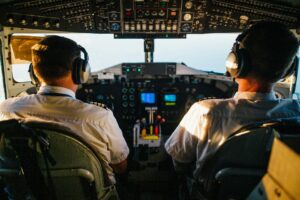How to Become a Pilot Professionally
A Guide to Becoming a Professional Pilot
- Obtain a High School Diploma or Equivalent:
- The first step towards becoming a pilot is to ensure you have a high school diploma or equivalent qualification.
- Research Flight Training Programs:
- Research and explore different flight training programs offered by accredited flight schools or aviation academies.
- Consider factors such as program structure, accreditation, certification, reputation, and location when choosing a flight training program.
- Meet the Age and Health Requirements:
- Ensure you meet the minimum age requirements set by aviation authorities in your country. Typically, aspiring pilots must be at least 18 years old to obtain a commercial pilot license.
- Undergo a medical examination by an aviation medical examiner (AME) to ensure you meet the health and fitness standards required for piloting.
- Enroll in a Flight Training Program:
- Enroll in a flight training program that suits your needs and goals, whether it’s a part 61 or part 141 training program.
- Work with experienced flight instructors who will guide you through ground school, flight training, and prepare you for written exams and practical tests.
- Obtain Pilot Licenses and Ratings:
- Start by obtaining a Private Pilot License (PPL), which allows you to fly for recreational purposes.
- Progress to obtaining a Commercial Pilot License (CPL) to fly for compensation or hire.
- Consider pursuing additional ratings and endorsements such as instrument rating, multi-engine rating, and type ratings for specific aircraft.
- Gain Flight Experience:
- Gain flight experience by logging flight hours and practicing your skills under the supervision of a flight instructor.
- Consider opportunities to gain flight experience through entry-level positions such as flight instructor, charter pilot, or corporate pilot.
- Build Your Network:
- Network with professionals in the aviation industry, including flight instructors, pilots, and aviation organizations.
- Attend aviation events, career fairs, and join aviation associations to expand your network and learn about job opportunities.
- Advance Your Career:
- Continue your education and training to advance your career as a professional pilot.
- Consider pursuing specialized training, certifications, and endorsements to qualify for higher-level positions in aviation, such as airline pilot or corporate pilot.
- Maintain Professionalism and Continued Learning:
- Uphold professionalism in all aspects of your career, including communication, decision-making, and teamwork.
- Stay updated on industry regulations, safety standards, and best practices through ongoing training and education.
- Pursue Your Passion:
- Above all, pursue your passion for flying with dedication, perseverance, and a commitment to safety and excellence.
- Embrace the challenges and rewards of a career in aviation, and enjoy the thrill of soaring through the skies as a professional pilot.
